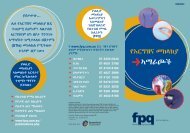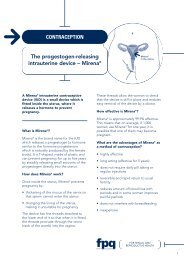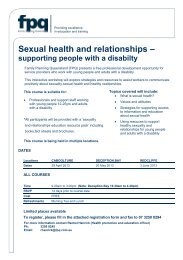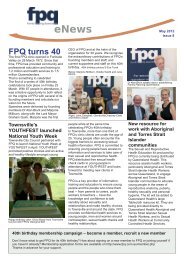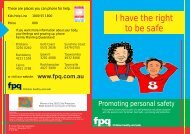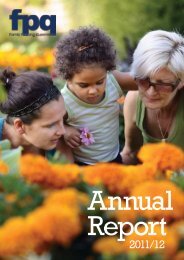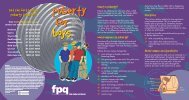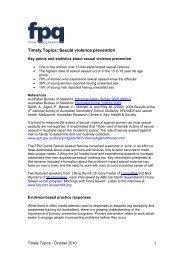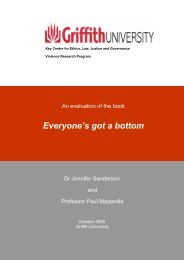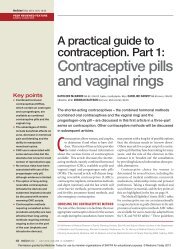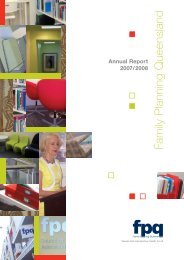A3 About Periods Fact Sheet - Family Planning Queensland
A3 About Periods Fact Sheet - Family Planning Queensland
A3 About Periods Fact Sheet - Family Planning Queensland
You also want an ePaper? Increase the reach of your titles
YUMPU automatically turns print PDFs into web optimized ePapers that Google loves.
-<br />
SEXUALITY<br />
<strong>About</strong> <strong>Periods</strong> –<br />
for parents and carers of girls<br />
and women with a learning<br />
difficulty or disability<br />
Girls and women with learning<br />
difficulties and disabilities get periods.<br />
All have different support needs and all<br />
can be helped to manage in some way.<br />
How can a parent or carer help?<br />
Parents and carers can help a girl or<br />
woman with a learning difficulty or<br />
disability to:<br />
• understand what is happening to her<br />
body when she has a period<br />
• learn the skills necessary for managing<br />
her period (menstrual management)<br />
• feel good about herself and her period<br />
The skills you have used in teaching other<br />
self care tasks will be helpful.<br />
When should I start discussing periods?<br />
The earlier children learn about their<br />
bodies the easier it will be to talk about<br />
body changes during puberty, including<br />
periods.<br />
Most girls start menstruating between the<br />
ages of nine and sixteen. It is a good idea<br />
to start talking about periods before the<br />
age of nine.<br />
No matter what the age, it’s never too late<br />
or too early to talk about periods and<br />
sexuality.<br />
What information should be included<br />
when talking about periods?<br />
Discussion about periods should include<br />
information about:<br />
• bodies<br />
• what periods are<br />
• pads or tampons<br />
• steps in how to manage periods<br />
While everyone is different, these general<br />
guidelines should be useful:<br />
• keep the language simple<br />
• give as much information as can be<br />
taken in and understood<br />
• let other family members and carers<br />
know what you are doing and saying so<br />
they can help<br />
• encourage practicing the wearing of<br />
pads before periods start<br />
• have a calendar so that she can record<br />
when her period is due<br />
• use encouragement and praise<br />
ADVOCATING FOR INCLUSIVE<br />
SEXUALITY EDUCATION<br />
1
• check the instructions are understood<br />
before encouraging practice<br />
• if discussing tampons, check the<br />
information and instructions for help<br />
Remember, it is also important to include<br />
discussion about sexuality issues when<br />
talking about periods and puberty and to<br />
talk about the possibility of pregnancy if<br />
the woman is sexually active.<br />
How do I talk about periods?<br />
Information about periods can be<br />
presented in clear, practical and simple<br />
terms. It is often important to repeat<br />
information several times. Consider the<br />
following ways of explaining about<br />
periods.<br />
<strong>About</strong> periods – general information<br />
Getting periods is healthy.<br />
It is a natural part of growing up and<br />
becoming a woman.<br />
Most girls start having their periods<br />
between the ages of nine and sixteen.<br />
Most women stop having periods when<br />
they are about 50.<br />
Boys and men don’t get periods.<br />
You can tell a trusted adult at home or<br />
school when you see blood on your pants<br />
for the first time.<br />
<strong>Periods</strong> are private. You can talk about<br />
them with people you know and trust, but<br />
not to just anyone.<br />
Everybody is different, so everyone’s<br />
experience of periods is going to be<br />
different.<br />
<strong>About</strong> periods – physical<br />
(showing a simple diagram might help)<br />
A period means that blood comes from<br />
inside a woman’s body. It comes through<br />
an opening between her legs. This<br />
opening is called a vagina.<br />
The blood that comes out is clean and<br />
healthy. It doesn’t mean you’ve been hurt.<br />
Other body changes may be happening<br />
when you start your period. Breasts get<br />
bigger and hair starts to grow under arms<br />
and around the vagina.<br />
You will have a period about once a<br />
month. Your period will last for a few days<br />
– about three to seven days.<br />
<strong>About</strong> pads<br />
(show a pad to help explain)<br />
Wearing a pad stops the blood from<br />
getting on your clothes.<br />
Pads should be changed every two to four<br />
hours or more often if necessary. Check<br />
your pad when you go to the toilet to see<br />
if it needs to be changed.<br />
Change your pad in a private place. The<br />
toilet, bathroom and bedroom are private<br />
places when the door is closed.<br />
<strong>About</strong> tampons<br />
(show a tampon to help explain)<br />
A tampon can be used for periods. It is<br />
put inside the vagina.<br />
Tampons should be changed at least four<br />
times a day.<br />
Some girls and women may take a bit of<br />
time to get used to tampons. They can be<br />
good when swimming, dancing or playing<br />
sport.<br />
At night while you are sleeping you might<br />
want to wear a pad.<br />
Everybody is different, some girls and<br />
women prefer to use pads and others<br />
might prefer to use tampons.<br />
Tampons are not recommended for<br />
women who cannot comfortably or<br />
physically manage their own menstrual<br />
self care.<br />
ADVOCATING FOR INCLUSIVE<br />
SEXUALITY EDUCATION<br />
2
- SEXUALITY<br />
How do I explain about changing a pad<br />
or tampon?<br />
When explaining how to change a pad or<br />
tampon, break the information down into<br />
easy steps. Focus on one point at a time.<br />
Remember to be practical and clear.<br />
The following is a suggested list of what<br />
you might say:<br />
Take a clean pad or tampon from drawer,<br />
or bag if away from home.<br />
1. Wash your hands.<br />
Go to the toilet and close the door. Pull<br />
down underpants and sit on the toilet.<br />
Check if the pad or tampon being worn<br />
needs to be changed.<br />
2. Take off your used pad or remove<br />
tampon.<br />
Wipe between legs with toilet paper.<br />
3. Wrap the used pad or tampon in toilet<br />
paper, or put in a paper or plastic bag.<br />
4. Put on a new pad or insert a new<br />
tampon.<br />
Peel off strip off new pad or unwrap<br />
tampon.<br />
Stick the pad down on your underpants<br />
or insert tampon into your vagina.<br />
Pull your underpants back up. Tidy your<br />
clothes.<br />
5. Put the used pad or tampon into a bin.<br />
Do not put pads in the toilet.<br />
Flush the toilet.<br />
6. Wash your hands.<br />
You may need to explain about the need<br />
to change underpants, if they have blood<br />
on them and incorporate this in your<br />
information.<br />
What about premenstrual syndrome?<br />
Premenstrual syndrome (PMS) and<br />
menstrual pain can happen to any woman.<br />
Symptoms can include:<br />
• irritability<br />
• tiredness<br />
• sore breasts<br />
• fluid retention<br />
• an increase in seizures for some women<br />
with epilepsy<br />
• outbreaks of recurrent infections<br />
• cramps<br />
• back pain<br />
Gentle exercise and healthy diet, a hot<br />
water bottle or warm bath can help ease<br />
some PMS symptoms. Medication and<br />
natural therapies are available for pain<br />
relief. Always consult a health professional<br />
if other medications are being used.<br />
3
-<br />
NOTES<br />
Where can I get more help?<br />
For some parents and carers talking about<br />
periods can be an easy and comfortable<br />
process. For some parents and carers<br />
talking about periods is a difficult and<br />
emotional process. Remember getting<br />
support can be helpful. Support is<br />
available to help parents and carers of<br />
girls and women who may need education<br />
and behavioural support.<br />
For more information about <strong>Family</strong><br />
<strong>Planning</strong> <strong>Queensland</strong> (FPQ) services or<br />
menstrual management, contact FPQ<br />
Education or visit www.fpq.com.au for<br />
reference to FPQ’s brochure, <strong>About</strong><br />
<strong>Periods</strong>.<br />
FPQ clinics can also help with sexual<br />
health care and contraceptive advice.<br />
Note: this fact sheet has been developed<br />
for parents and carers of people with<br />
learning difficulties. Publications are most<br />
effective when used as part of a<br />
comprehensive sexuality education<br />
program.<br />
Disclaimer<br />
<strong>Family</strong> <strong>Planning</strong> <strong>Queensland</strong> (FPQ) has taken every care to ensure that the<br />
information contained in this publication is accurate and up-to-date at the<br />
time of being published. As information and knowledge is constantly<br />
changing, readers are strongly advised to confirm that the information<br />
complies with present research, legislation and policy guidelines. FPQ<br />
accepts no responsibility for difficulties that may arise as a result of an<br />
individual acting on the advice and recommendations it contains.<br />
© <strong>Family</strong> <strong>Planning</strong> <strong>Queensland</strong><br />
Version 2 / August 2008<br />
P: 09/2008 5m<br />
Funded with assistance by<br />
i<br />
Phone: 07 3250 0240<br />
www.fpq.com.au<br />
ADVOCATING FOR INCLUSIVE<br />
SEXUALITY EDUCATION<br />
4



